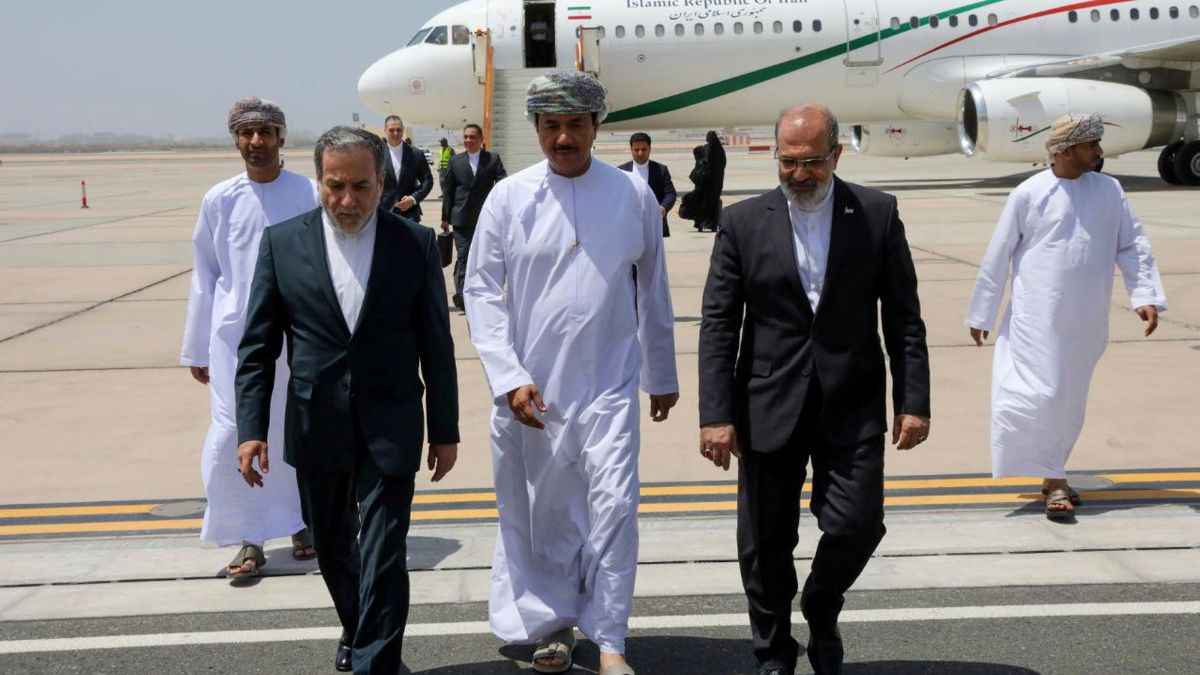US and Iran hold 'difficult but useful' nuclear talks in Muscat. Details here
 Iranian Foreign Minister Abbas Araghchi, left, is welcomed by an unidentified Omani official, center, upon his arrival at Muscat, Oman, for negotiations with U.S. Mideast envoy Steve Witkoff | AP
Iranian Foreign Minister Abbas Araghchi, left, is welcomed by an unidentified Omani official, center, upon his arrival at Muscat, Oman, for negotiations with U.S. Mideast envoy Steve Witkoff | AP
The United States and Iran completed the fourth round of their negotiations in Muscat, Oman, on Sunday over Tehran’s advancing nuclear programme, with both sides agreeing to reconvene at a later date. The talks, held amid growing regional tensions and ahead of President Donald Trump’s visit to the Middle East, lasted approximately three hours.
Trump's Middle East Envoy Steve Witkoff described the discussions as encouraging, while Iranian Foreign Minister Abbas Araghchi said they were challenging but constructive. The negotiations, which were both direct and indirect, were facilitated by Omani Foreign Minister Badr al-Busaidi, who shuttled between the delegations and later said the exchanges featured original ideas and reflected a mutual desire to reach an honourable agreement.
Although some face-to-face engagement took place, Iranian officials maintained that most of the talks were indirect—likely a concession to domestic political pressures within Iran. Araghchi asked the US side to refrain from issuing demands through the media, warning that such tactics further complicate the diplomatic process.
The talks aim to restrict Iran’s nuclear activities in return for relief from the heavy sanctions that have crippled its economy. Washington’s primary demand is that Tehran abandon its uranium enrichment programme altogether—a condition Iranian officials strongly reject. While Iran maintains that its nuclear ambitions are purely peaceful, US officials remain sceptical, citing past instances of undeclared activities and the country’s enrichment levels, which now stand at up to 60 per cent purity, alarmingly close to weapons-grade.
The US envoy stated that some technical progress had been made and that the negotiations would continue soon. However, signs of a breakthrough remain limited, and fundamental differences persist. One major sticking point is Iran’s insistence on continuing uranium enrichment within its own borders. Iranian officials reiterated over the weekend that this issue was non-negotiable, although they indicated a willingness to discuss restrictions on the volume and level of enrichment as a trust-building measure.
Since the collapse of the 2015 nuclear agreement following the Trump administration’s unilateral withdrawal in 2018, Iran has accelerated its nuclear activities and abandoned previous limitations. The earlier deal had capped enrichment at 3.67 per cent and limited Iran’s uranium stockpile to 300kg, levels far below those required for nuclear weapons.
Tensions have escalated further with Israel’s repeated warnings about Iran’s nuclear ambitions. The Israeli government has threatened to act unilaterally if it perceives a threat, even as it continues to urge Washington to take a harder line. Trump himself has also issued several warnings, suggesting the US would consider military action—potentially in coordination with Israel—if Iran fails to compromise. In recent media interviews, Witkoff has oscillated between allowing low-level enrichment and demanding a total halt to Iran’s programme, calling for the dismantling of facilities at Natanz, Fordow and Isfahan.
Despite the high stakes, the fact that such high-level talks are occurring at all is seen as a modest diplomatic achievement. The economic impact of the negotiations has already been felt in Iran, where the embattled rial currency strengthened significantly against the dollar in response to news of the dialogue.
Nevertheless, a deal remains elusive. Trump has earlier given Iran a two-month deadline in a letter sent to Supreme Leader Ayatollah Ali Khamenei via an Emirati intermediary. With the US president set to embark on a regional tour of Saudi Arabia, Qatar and the UAE this week, the clock appears to be ticking.
Domestic challenges within Iran add further complexity. The country continues to witness public defiance of the compulsory hijab law, and there are growing concerns that fuel price hikes could trigger unrest, as they have in the past.
No date has been confirmed for the fifth round of talks, although Oman has stated it will announce one after both parties consult their respective leaderships.
Against this tense backdrop, Iran continues to defend its position. “Iran continues negotiations in good faith, and if the goal of these talks is to ensure the non-acquisition of nuclear weapons, an agreement is possible. However, if the aim is to limit Iran’s nuclear rights, Iran will never retreat from its rights.”
Middle East